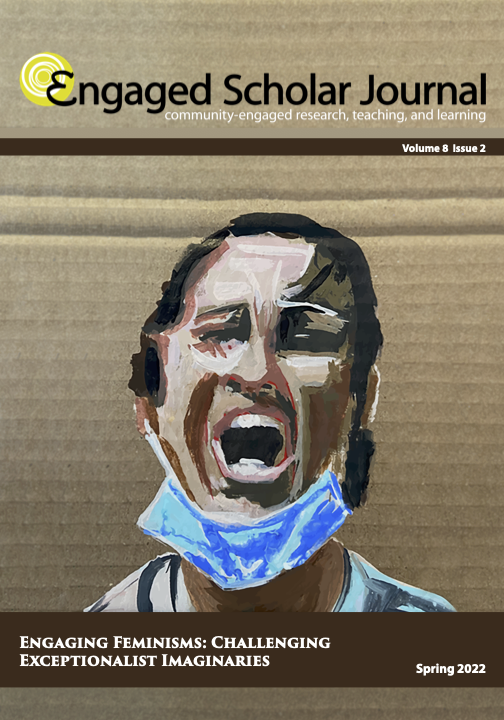Women and Allies in Action: College Students as 'Diversity Workers' in the Activism Classroom
DOI:
https://doi.org/10.15402/esj.v8i2.70744Keywords:
feminist activism, feminist pedagogy, experiential learningAbstract
Research on feminist pedagogy has analyzed activism-based teaching practices in introductory courses and special topics courses in Women’s and Gender Studies (WGS). Few studies have focused on courses that entirely center on feminist activism and have students implement weeks-long activism projects. In this article, I investigate how we can transfer an activist consciousness to our students, some of whom might not consider themselves feminists, might not have thought of themselves as activists, have not participated in any form of activism, or might be taking a WGS course only for general education or diversity credit. Using data collected in my “Women and Allies in Action” class via surveys, interviews, and analysis of students’ reflective writing, I assess which challenges hold students back and what motivates them to create and implement complex, creative, and sustainable feminist activism projects.
References
Ahmed, S. (2012). On being included: Racism and diversity in institutional life. Duke University Press.
Ahmed, S. (2015, June 29) Against students. The New Inquiry, https://thenewinquiry.com/against-students
Ahmed, S. (2017). Living a feminist life. Duke University Press.
Arnold, G. (2014). Feminism in Action [Conference presentation]. National Women’s Studies Association Convention, San Juan, Puerto Rico, 2014, November 13-16).
Baumgardner, J., & Richards, A. (2005). Grassroots. Farrar, Straus, and Giroux.
Bickford, D. M., & Reynolds, N. (2002). Activism and service-learning: Reframing volunteerism as acts of dissent. Pedagogy, 2(2), 229-252.
Bubriski, A., & Semaan, I. (2009). Activist learning vs. service learning in a women’s studies classroom. Human Architecture: Journal of the Sociology of Self-Knowledge, 7(3), 91-98. https://www.okcir.com/product/journal-article-activist-learning-vs-service-learning-in-awomens-studies-classroom-by-anne-bubriski-and-ingrid-semaan
Dean, A. (2019). Colonialism, neoliberalism, and university-community engagement: What sorts of encounters with difference are our institutions prioritizing? In A. Dean, J. Johnson, & S. Luhmann (Eds.), Feminist praxis revisited: Critical reflections on university community engagements (pp. 23-37). Wilfried Laurier University Press.
Dean, A., Johnson, J., & Luhmann, S. (Eds.). (2019). Feminist praxis revisited: Critical reflections on university community engagements. Wilfried Laurier University Press.
Forbes, K, Garber, L., Kensinger, L., & Slagter, J. T. (1999). Punishing pedagogy: The failings of
forced volunteerism. Women’s Studies Quarterly, 27(3/4), 158-168.
hooks, b. (1994). Teaching to transgress: Education as the practice of freedom. Routledge.
Johnson, J. L. (2018). The de-territorialization of knowledge-production in Canadian women’s and gender studies programs. In A. Dean, J. Johnson, & S. Luhmann (Eds.), Feminist praxis revisited: Critical reflections on university community engagements (pp. 147-163). Wilfried Laurier University Press.
Johnson, J. L., & Luhmann, S. (2015/16). Social justice for (university) credit? The women’s and gender studies practicum in the neoliberal university. Resources for Feminist Research, 34(3/4), 40-59.
Messer-Davidow, E. (2002). Disciplining feminism: From social activism to academic discourse. Duke University Press.
Naples, N. A. (Ed.) (1998). Community activism and feminist politics. Routledge.
Naples, N. A. (2002). The dynamics of critical pedagogy, experiential learning, and feminist praxis in women’s studies. In N. A. Naples, & K. Bojar (Eds.), Teaching feminist activism: Strategies from the field (pp. 9-21). Routledge.
Orr, C. (2012). Activism. In C. M. Orr, A. Braithwaite, & D. Lichtenstein (Eds.), Rethinking women’s and gender studies (pp. 85-101). Routledge.
Peet, M. R., & Reed, B. G. (2002). The development of political consciousness and agency: The role of activism and race/ethnicity in an introductory women’s studies course. Feminist Teacher, 14(2), 106-122. https://www.jstor.org/stable/40545879
Pratt, A. (1999). Women’s studies and me: Empowerment and activism. Women’s Studies Quarterly, 27(3/4), 203-211. https://www.jstor.org/stable/40004488
Rose, S. (1989). The protest as a teaching technique for promoting feminist activism. NWSA Journal, 1(3), 486-490. https://www.jstor.org/stable/4315928
Seethaler, I. (2014). Feminist service learning: Teaching about oppression to work toward social change. Feminist Teacher, 25(1), 39-54. https://doi.org/10.5406/femteacher.25.1.0039
Taylor, J. (2019). Quick to the draw: Shooting from the hip in feminist NGOs. In A. Dean, J. Johnson, & S. Luhmann (Eds.), Feminist praxis revisited: Critical reflections on university community engagements (pp. 105-114). Wilfried Laurier University Press.
Tice, K. W. (2002). Feminist theory/practice pedagogies in a shifting political climate. Feminist Teacher, 14(2), 123-133. https://www.jstor.org/stable/40545880
Whitney, S. (2018). Byproductive labour: A feminist theory of affective labor beyond the productive–reproductive distinction. Philosophy and Social Criticism, 44(6), 637–660. https://doi.org/10.1177/0191453717741934
Zimmerman, B. (2002). The past in our present: Theorizing the activist project of women’s studies. In R. Wiegman (Ed.), Women’s studies on its own: A next wave reader in institutional change (pp.183-190). Duke University Press.
Published
How to Cite
Issue
Section
License
Authors who publish with this journal agree to the following terms:
- Authors retain copyright and grant the journal right of first publication with the work simultaneously licensed under a Creative Commons Attribution License CC BY 4.0 that allows others to share the work with an acknowledgement of the work's authorship and initial publication in this journal.
- Authors are able to enter separate, additional contractual agreements for the non-exclusive distribution of the journal's published version of the work (e.g., post it to an institutional repository or publish it in a book), with an acknowledgement of its initial publication in this journal.
- Authors are permitted to post their work online (e.g., in an institutional repository or on their website) after the publication of their work in the Engaged Scholar Journal.
- Please note that while every opportunity will be taken to ensure author participation in the editing process, due to time constraints final copyediting changes may be made before publication to ensure APA adherence throughout all submissions.




